Mega Archive: Part XXXIII: From Blaster Master 2 to Chi Chi's Pro Challenge Golf
By Mento 1 Comments
Welcome back to the Mega Archive, still chronologically displaced thirty years to the day as we cover the Sega Mega Drive/Genesis's release schedule for June 1993 in its entirety. A remarkable rarity for this Mega Archive is that we have almost zero crossover with the SNES: it's all going to be system exclusives and PC/Amiga/Arcade ports this time around, with just one exception. The genre breakdown still, sadly, heavily favors sports games with four new ones in this batch of ten, though at least one doesn't quite take its sport as seriously as the others. We also have a few shooters, a realistic (by 16-bit standards) flight sim, a physics-based platformer, a lesser sequel to a NES classic, and a game that will literally play itself if you leave it alone. An eclectic bunch as always.
Next month this feature will see us back in Sega CD territory, catching us up to the end of June and reaching the midpoint of what's proven to be a busy year for both the Mega Archive and the Mega Archive CD. We'll be slipping out of this temporal sync around the same time as well, since we won't see any July '93 games until August, but that was never going to last as we get closer to the end of the year. The Sega Mega Drive was, after all, the highest selling console in the world for 1993 so expect to see a lot more third-party support in the near future.
Speaking of support, you can support this feature by revisiting some of its earlier entries: (Rejoice! No more giant ugly tables, I've put everything into one handy Google Sheet for your perusal. All games and Mega Archive links have been included, and the Mega Archive CD is in there too.)
Part XXXIII: 431-440 (June '93)
431: Blaster Master 2

- Developer: Software Creations
- Publisher: Sunsoft
- JP Release: N/A
- NA Release: June 1993
- EU Release: N/A
- Franchise: Blaster Master
- Genre: Platformer / Shooter
- Theme: The Mastery of Blastery
- Premise: Jason McWesternprotag and his adaptable battle tank SOPHIA are back to take on the subterranean forces of evil.
- Availability: Since it had an external developer, Sunsoft hasn't seen fit to rerelease it in any capacity and it was produced in short quantities to begin with. Tracking down a copy would be like trying to find a pet frog in a cave complex these days.
- Preservation: Ya hate to see it, folks—a sequel to a popular Japanese game made on the cheap by a western studio working on commission. We've already seen that happen before with Strider II a few months back [MA #XXX]. That said, Software Creations is one of my favorite UK developers from that era and this sequel isn't exactly hot trash even if it misses much of what made the NES original so beloved. It kinda feels like Turrican during the side-scrolling sections and Xenon during the top-down sections, though maybe that's my own British biases coming through. We last saw Software Creations with the Double Dragon 3 port [MA #XXVIII], and for Sega owners they're mostly known for MD Double Dragon and a few licensed games like Spider-Man & Venom: Maximum Carnage or The Tick (meanwhile, the more fortunate SNES owners got originals like Plok and Equinox). They also converted both the first Double Dragon and Super Off-Road back in 1992, neither of which I bothered to include in this feature? I'm still scratching my head as to how I could've possibly missed them given I used three separate online lists to compile my own, but I guess I'll have to do some major auditing of this feature in the near future. Can't wait for that.
- Wiki Notes: Once again, we have a mystery release date—March 15th, oddly specific for a NA release—with apparently zero evidence to back it up but SegaRetro has two separate citations (from gaming mags, but close enough to legit) for June '93, so that's what we've gone with. It also needed some fresh screenshots (including the all-important title screen) and some body text. Feels like there's more of a story here, but I guess most Blaster Master Baiters (their fan name; not mine) (OK, it's mine) prefer to forget it exists.
432: Championship Bowling / Boogie Woogie Bowling
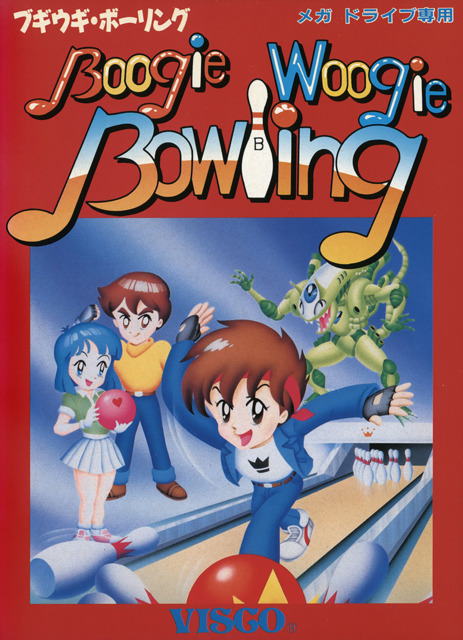
- Developer: Soft Machine
- Publisher: Mentrix Software (NA) / Visco (JP)
- JP Release: 1993-12-17 (as Boogie Woogie Bowling)
- NA Release: June 1993 (as Championship Bowling)
- EU Release: N/A
- Franchise: N/A
- Genre: Bowling
- Theme: Striking harder than the WGA.
- Premise: Sometimes in life you just need to throw a heavy ball at some wooden pins that vaguely look like people. Maybe those people are hated family members you only see at Thanksgiving, maybe they're the coworkers that laugh at your business casual shirt choices, or maybe they're Swiss people and you just have a weird thing about the Swiss. Either way, they're all getting knocked over tonight. They know what they did.
- Availability: Nope. I don't think any of these companies exist any more.
- Preservation: It's our first (and only) bowling game for the Sega Genesis and what a totally ordinary one of those it is. As with golf, there's not much to do but pick a direction, apply spin if you like, and hit a moving power gauge at the desired level of strength. The JP version is less ordinary since it went with this jokey aesthetic which the spoilsports at Mentrix had to redo, dropping the original's anime character designs and the whole "Boogie Woogie" aspect since that was going to be way too camp for the mostly serious North American bowler crowd (though they kept the soundtrack). I just love that JP cover art though. You have the protagonist with his shounen manga headband, his girlfriend, the guy she told him not to worry about, and the homicidal xenomorph invader she told him he should absolutely worry about (who is called Erina, incidentally). Soft Machine we've encountered only once before and will only encounter once again: those games being Top Pro Golf [MA #XVIII] and its sequel Chi Chi's Pro Challenge Golf (which we'll be covering later this entry, coincidentally enough). Visco and Mentrix are somehow connected—the latter released the former's games overseas—and we last saw that pair for the fantasy platformer Wardner [MA #VIII].
- Wiki Notes: All these mystery dates are giving me some serious paranoia. Why does the internet think this game was released on Valentine's Day? Is bowling inherently romantic? June is the alternative SegaRetro suggests, but even that seems kinda doubtful. For one, it makes little sense that a heavily reworked localization came out six months before the original unless there was a reason to delay the JP release. Whatever, wiki editing is an iterative process; if the GB Wiki's around in the future when someone figures this date business out, they can absolutely feel free to fix it. (As for the page, it was a skeleton so it needed a little of everything.)
433: F-15 Strike Eagle II
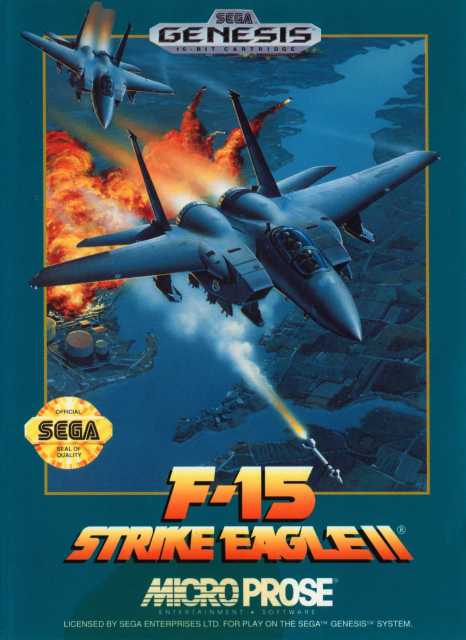
- Developer: MicroProse
- Publisher: MicroProse
- JP Release: N/A
- NA Release: June 1993
- EU Release: December 1993
- Franchise: F-15 Strike Eagle
- Genre: Dogfighting Sim (not the Michael Vick kind)
- Theme: "Highway to the Danger Zone"
- Premise: If you have a need, a need for me to repeat one of the two Top Gun quotes I can remember, then I can be your wingman anytime because here's the game for you.
- Availability: Some contemporary PC versions that might be easier to find, albeit in a not entirely legal sense via abandonware sites. Otherwise just play a more modern flight sim with F-15s in it, maybe?
- Preservation: We've seen a few flight sim franchises try their luck on the Sega Genesis, perhaps figuring that if it could handle super-scaler jet shooters like After Burner then an early polygonal affair from the world of high-spec PC gaming would be just as feasible. Those games include the likes of EA's F-22 Interceptor: Advanced Tactical Fighter [MA #XII] and LHX Attack Chopper [MA #XXII]. There's no arguing that they're struggling a little on Genesis hardware but one benefit here is that this game was already four years old when it made the leap, so the technology's not too much for the MD's 68k processor to handle. They added a few extra scenarios to the Genesis version (or else included those from an expansion) including some hypothetical conflicts with a 1980s Viet Cong or a full on Soviet invasion. I wouldn't have minded seeing a F-15 take on a TIE Fighter or a dragon or something but I guess this is still supposed to be a game to be taken seriously. Boo. At any rate, there's three of these F-15 Strike Eagle games but this is the only one we'll be seeing here.
- Wiki Notes: Beefed up the body text and added a few releases.
434: Mutant League Football
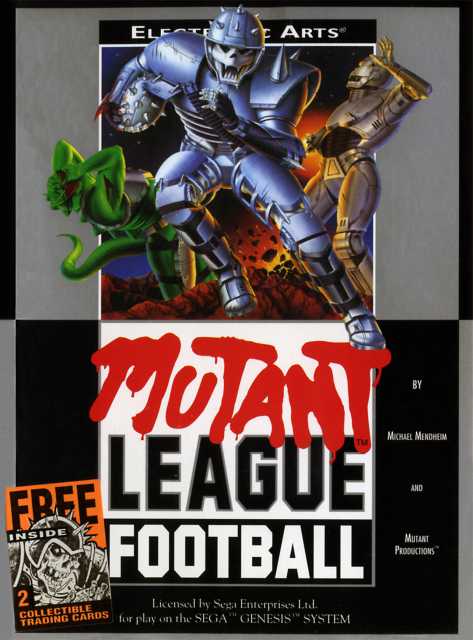
- Developer: Mutant Productions
- Publisher: Electronic Arts
- JP Release: 1993-09-10
- NA Release: June 1993
- EU Release: August 1993
- Franchise: Mutant League Sports
- Genre: Football
- Theme: Violence
- Premise: Join Bones Jackson and the rest of the team of monsters in the bloodiest football game outside that opening scene from The Last Boy Scout. (I know, that was kinda esoteric. I should probably kill that ref.)
- Availability: It became available again via the EA Replay compilation for PSP in 2006. Other than that, your best bet is the Kickstarter remake Mutant Football League from 2017.
- Preservation: You push the internal EA Sports development teams far enough and they'll eventually start acting out, putting together a campy horror version of American football where players violently explode whenever they catch a pass because someone stuck a bomb inside the pigskin and bribed the referee to ignore the loud ticking sound. Thus was the ludicrously gruesome, or ludigruesome, Mutant League franchise born. This would be the first game, with the 1994 follow-up making a lateral to the already plenty-violent world of the NHL with Mutant League Hockey. Mutant Productions is like Sonic Team in that they were originally an internal division founded specifically to work on a single franchise. Despite being a deliberately unserious take on football, it was built on the turduckified bones of the Madden NFL series to at least give it some legitimacy as a sports game for those sheltered few just looking to play some normal football with a bunch of skeletons and orcs. I bet they colored inside the lines too, the squares.
- Wiki Notes: Just some releases.
435: Puggsy
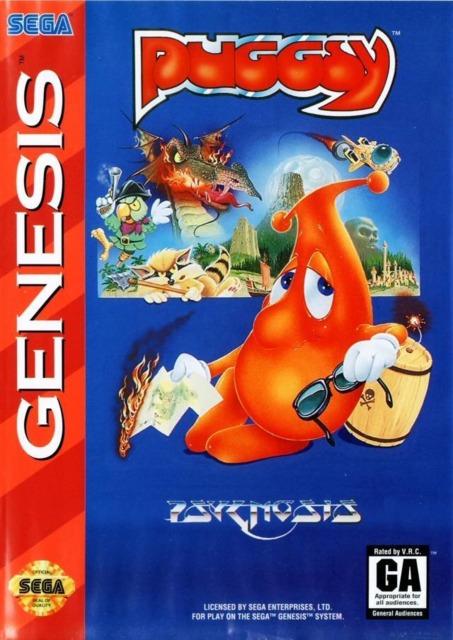
- Developer: Traveller's Tales
- Publisher: Psygnosis
- JP Release: N/A
- NA Release: 1994-01-06
- EU Release: June 1993
- Franchise: N/A
- Genre: Puzzle-Platformer
- Theme: Alien Discovers That Earth Kinda Sucks
- Premise: Puggsy, a tubby orange alien, has crash landed on a strange planet and needs to recover all the parts to his spaceship from the locals. Wait... that sounds familiar...
- Availability: Beyond an enhanced Sega CD port, nothing recent.
- Preservation: We have here, as Gerstmann would say, an "Amiga-ass platformer". Puggsy is every bit the UK video game hero: humble, not much to look at unless you have a thing for sapient nutsacks (a comparison made by the game's official marketing, no less), and is put through the wringer as he attempts to find a way home that doesn't involve a wuss solution like calling his parents to come pick him up like some other extraterrestrial schmucks. However, the game has some impressive credentials: it's one of the earliest puzzle-platformers to use physics, which has now become commonplace in the Indie market. Objects not only serve specific roles, but might also have their uses relating to their composition and weight as well. A barrel can be used as a stepping stone or a weapon, but because it floats it can be used as a bridge too. Also, no, this game isn't an Addams Family thing. I can't be the only one who thought that from the name, especially as there's a Pugsley's Scavenger Hunt for the SNES. On that note, this is our second game this entry that was also slated for a SNES release and didn't get one for various reasons; Genesis fans can rejoice over another exclusive. This would be our second Traveller's Tales game after Galahad [MA #XXI] but we've a few more to discover, one of which is coming up very soon.
- Wiki Notes: Needed some major text clean-up due to all the second-person but beyond that just a release and some screenshots. I'll come back to it later for the SCD content.
436: R.B.I. Baseball '93
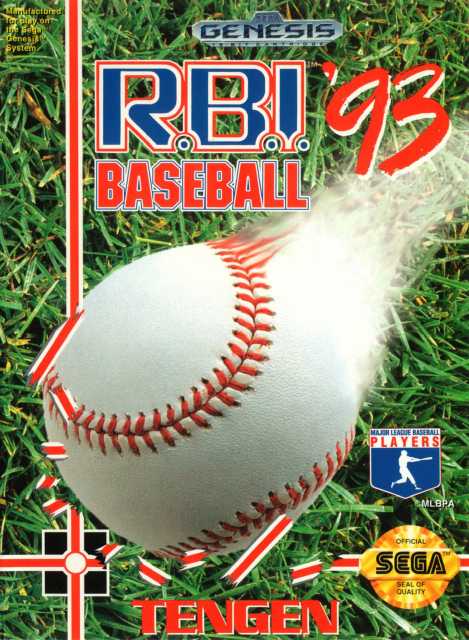
- Developer: Tengen
- Publisher: Tengen
- JP Release: N/A
- NA Release: June 1993
- EU Release: N/A
- Franchise: R.B.I. Baseball
- Genre: Baseball
- Theme: Baseball
- Premise: Baseball
- Availability: R.B.I. Baseball was revived somewhat recently, but it looks to have become dormant again.
- Preservation: We're back once again with more Atari baseball, and as if to make an implicit threat they've now moved to annual iterations. This would be the third R.B.I. Baseball to hit the Sega Genesis (and thus the third to appear on the Mega Archive, after R.B.I. Baseball 3 and R.B.I. Baseball 4) and the second to be exclusive to the platform. Still a couple more after this too, so I better find a way to make this MLBPA-affiliated baseball series interesting to talk about. But then, haven't American sports scholars since the dawn of the republic struggled to make baseball interesting? What hope do I have of succeeding where they've failed? At any rate, I won't bore you all with the usual spiel that R.B.I. Baseball began as a graphically altered Famista clone that has long since gone its own way. See you all again for R.B.I. Baseball '94!
- Wiki Notes: Skeleton page, so it needed everything.
437: Toys
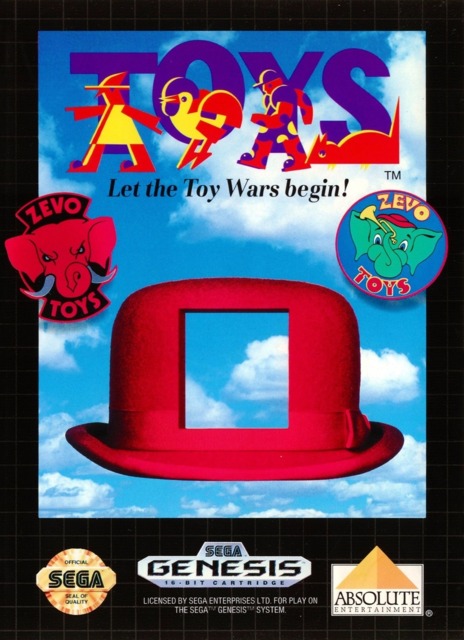
- Developer: Imagineering
- Publisher: Absolute Entertainment
- JP Release: N/A
- NA Release: June 1993
- EU Release: N/A
- Franchise: N/A
- Genre: Action?
- Theme: Magritte Paintings. Ceci n'est pas une bon film.
- Premise: Video games aren't toys, but Toys is a video game. Just not a very good one.
- Availability: About as much chance at a rerelease as the movie does of getting a remake.
- Preservation: Hook was not the only Robin Williams to receive a video game tie-in for the Sega Genesis, as the Barry Levinson film Toys also managed to earn itself one for reasons beyond reckoning (and there's also Aladdin, I guess). Set in a toy factory under new management, the military-minded Leland Zevo essentially invents drone warfare compelling the deceased owner's carefree son, Leslie, to try to force him out with the help of his soldier cousin, his girlfriend, and a sisterbot. If Hook was seen as too precious with its elaborate set design and its Williams protagonist as too childlike, Toys is the ne plus ultra of those critiques. That said, the movie does have its cult following drawn to its unpredictable nature and a significant degree of surreal style. Plus, there's Joan Cusack. And a really young Jamie Foxx? Anyway, it's one of those movies that maybe needs to be seen to be believed but that sentiment doesn't quite extend to the game, which is this weird isometric shooter thing where you can barely see three feet in front of you.
- Wiki Notes: Our only SNES double-dip for this Mega Archive entry. MD-specific releases and screenshots.
438: Barney's Hide & Seek Game
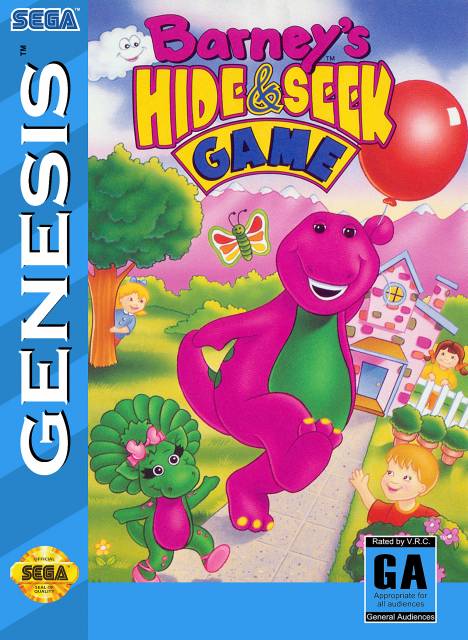
- Developer: Realtime Associates
- Publisher: Sega
- JP Release: N/A
- NA Release: 1993-06-01
- EU Release: N/A
- Franchise: Barney
- Genre: Educational, Sorta
- Theme: Putting the "Pal" in "Paleontological Nightmare"
- Premise: Barney's just out here telling folks about numbers and shapes and colors and shit. The people have to know. But are they ready to know?
- Availability: Is Barney still a thing? I don't think this is getting a rerelease any time soon either way.
- Preservation: You obviously can't judge something like this by the standards of a real video game, but you can consider how it might function if left in front of a preschool kid fascinated by Barney. In that regard, it actually acquits itself reasonably well: the game has big, colorful sprites that are easy to comprehend, Barney actually talks to the player (and in fact never shuts up) with clips from his usual voice actor Bob West, and if the rigors of walking slowly to the right ever get to be too much Barney will essentially take over and finish the game on your behalf, more or less turning it into an episode of the TV show that you can sit back and watch. Speaking of which, there's a speedrunning category for "no controller" in which I'm proud to claim I've earned a spot on its leaderboards. That is to say, I just left it playing while checking on its wiki page and I think I have half its Retro Achievements now. As a video game suitable for anyone over 4? Oh, sure, it sucks. (Welcome to Realtime Associates, by the by, an American developer that'll show again a few more times with other, better licensed games.)
- Wiki Notes: A very minor amount of clean-up.
439: Slap Fight MD
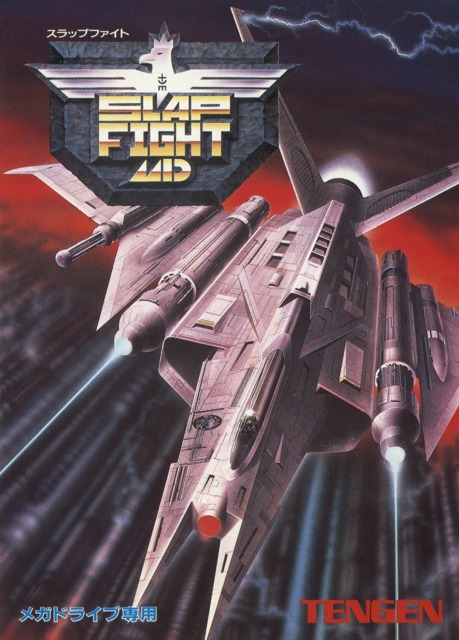
- Developer: MNM Software
- Publisher: Tengen
- JP Release: 1993-06-11
- NA Release: N/A
- EU Release: N/A
- Franchise: N/A
- Genre: Shoot 'em Up (Vertical)
- Theme: Sci-fi / Alien Invasion
- Premise: That bitch Joanne took the last Gucci handbag during the sales at Macy's and there's only one way this disagreement is going to resolve itself.
- Availability: It's on the Sega Genesis Mini, albeit the Japanese/Asian one. The original's also in a Toaplan compilation for the Evercade.
- Preservation: Ah, this takes me back. Used to be that every other game on the Mega Archive was a shoot 'em up arcade conversion. The amazingly-named Slap Fight (some western ports changed the name to A.L.C.O.N. instead, the name of the protagonist's in-game organization) is a 1986 Toaplan shoot 'em up that eventually found its way to the Sega Mega Drive a mere seven years later. It's fairly standard as vertical shoot 'em ups go, adopting a power-up system much like Gradius's where you can "invest" building points to acquire stronger upgrades down the road or spend them early for utility upgrades like a speed boost to keep yourself alive in the short-term. It has that clean 1980s arcade game look without a whole lot of visual pizazz, jazz, or indeed razzmatazz but it does look pretty ancient as a result. The claustrophobic amount of screen real estate doesn't help either. This conversion was done by MNM Software, whom we've met once before with their A-Train console port A Ressha de Ikou MD [MA #XVII]. This is the last game the company produced under the MNM brand; however, they did come back in 1995 as Mindware and have been focusing on pinball tables ever since.
- Wiki Notes: Just some MD screenshots. We got a wiki duder named Fiye that focuses on older computer games who's done most of the work here already.
440: Chi Chi's Pro Challenge Golf / Top Pro Golf 2
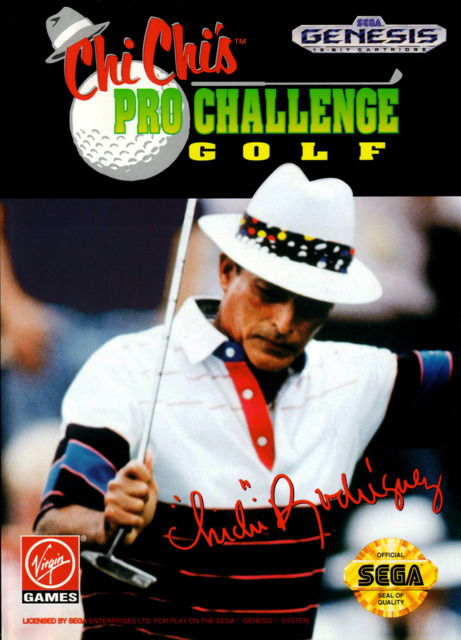
- Developer: Soft Machine
- Publisher: Soft Vision (JP) / Virgin Games (NA)
- JP Release: 1993-06-25 (as Top Pro Golf 2)
- NA Release: July 1993 (as Chi Chi's Pro Challenge Golf)
- EU Release: N/A
- Franchise: Top Pro Golf
- Genre: Golf
- Theme: Golf
- Premise: Golf
- Availability: Nope. Endorsed sports games age faster than jokes about WGA strikes. (Support writers, otherwise my jokes are all you'll get.)
- Preservation: Another month, another golfing sim. This would be the other Soft Machine game coming out this month, a sequel to their Top Pro Golf [MA #XVIII], and one that managed to pick up an endorsement deal on its way to the States. Juan Rodriguez is the famous sportsman in question, a Puerto Rican native who won eight titles in the PGA Tour during his professional career. Dude had quite the personality: during games, he'd do this little toreador dance with his hat when celebrating, which this game recreates in its intro. The Japanese version doesn't really have any similar flair nor any endorsements, though its tropical theme suggests it's possibly set in Pebble Beach or Waialae. Amusing coincidence is that "Chi Chi", Juan Rodriguez's nickname, is also a semi-formal term you'd use to refer to your father in Japanese. Since golf has always felt like a sport for dads that title kinda works outside of the endorsement context too.
- Wiki Notes: Again, the internet seems to think the localized version—which had to add all the Chi Chi stuff, and programming in that fedora alone would've taken several weeks of development—was released three months prior to the original, around March '93. I've gone with SegaRetro's estimate of July, the following month, since it's possible the localization and endorsement deal were in effect while the game was still in production.
